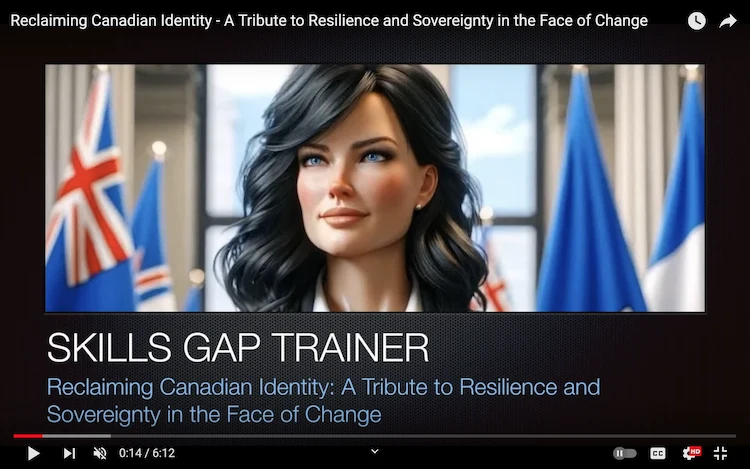Video Title: Alberta premier celebrates Supreme Court decision on Bill C-69, says province “open for business”
Video Title: Reclaiming Canadian Identity – A Tribute to Resilience and Sovereignty in the Face of Change
Link: https://youtu.be/gwTezn-aaCo?si=BvYbLg_oNBjDV0kC
In the vast expanses of Canada, where the towering Rockies merge with pristine lakes and never-ending forests, our nation is perpetually in a quest for its identity. This identity is sculpted by cinematic tales, military achievements, nature’s splendor, and our ever-shifting political terrain.
Venturing back to the golden era of television in the ’80s and ’90s, the world was captivated by characters exuding resilience, integrity, heroism and determination. Tom Cruise’s unstoppable resolve in the “Mission Impossible” series, Will Smith’s moral fortitude in “I, Robot”, Chuck Norris’s relentless spirit in “Delta Force” and “Lone Wolf McQuade”, Batman’s unwavering pursuit of justice, Sean Connery’s commanding role in “The Hunt for Red October”, Arnold Schwarzenegger’s tenacity in the Terminator series, and the iconic RCMP mountie in shows like “Due South” and “Passchendaele” all painted North America, and specifically Canada, as a beacon of valour, justice, and self-evolution. These characters have become the heroes through which many, both immigrants and Canadian-born, envisioned their lives and identities, until a voice challenged this narrative, attempting to paint them as devoid of substance, or “blank slates in need of a new specification”.
In the skies above, Canada’s military tales soared. The Royal Canadian Air Force’s CF-18 demo jets weren’t just machines; they became symbols of aerial dominance. The astounding formations of the Blue Angels and the mesmerizing Air shows depicted precision, discipline, and collective spirit. This was also evident in the CADETS and the leadership school for DND. The Royal Canadian Navy, with its legacy from World War II, where it commanded over 1,140 ships, narrated tales of bravery on turbulent seas, showcasing the industrial capability and productivity work spirit of a nation of just 20 million. It would be amazing if we could build 1140 ships today, even with new technology and 40 million people, but despite such tremendous advantages, this task would still be impossible with the leadership we presently have.
However, beneath these heroic tales, shadows began to form. Canada’s dream of becoming an energy giant, represented by the 18 ambitious LNG projects, the insight of the global business community knowing very well this was Canada’s destiny, found itself entangled in bureaucratic webs, particularly due to post-2015 figures like Gibeau and Trudeau. The Canadian dream of being an energy titan, symbolized by the ambitious 18 LNG projects, found itself ensnared in layers of bureaucracy, and impossible permit approvals. A culture of “gatekeeping”, “demographic discrimination” and “identity discrimination” arose, it arose in HR, in Public Grant Programs, in University Research and National Research Grant Programs, in Corporate Mobility, in Energy Development, in Banking/Financial HR sector, in Real Estate, in BC Public Service, in Tech industry, in Crown Land Access/Zoning Permits, in Real Estate Development, etc.. With the rise of a culture of “multi-sector gatekeeping”, “discrimination based on identity” and “discrimination based on demography” began to seep into various sectors.
Meanwhile, dictators abroad rejoiced as Canada’s potential dimmed, having been a country once poised to offer vast landscapes, endless lands, and a civilized sanctuary for those aspiring for greatness and for a nation of great security and of great ambitions. The post-2015 leadership saw the national debt skyrocket, not gradually increase as it had done for 22 other prime ministers which also faced catastrophes, but the national debt more than doubled in the blink of an eye. Dictators consolidated their power, taking commodity and energy profits that could have been Canada’s, all while ignoring the looming threats that many had warned of. The once-predicted Canadian leadership in the world’s energy markets shifted, with dictators now holding the reins to the global world order.
Recent political shifts have projected a different image of Canada, emphasizing soft and meek urban living, which seemed to dilute the robust ethos that defined our nation’s history and our nation’s identity. This new vision diverged from the rugged pioneers and resilient workers in Canada familiar to many nations and cultures around the world, even in the most disconnected and remote and primitive rural lands, they know of the quality of the supreme quality of the Canadian worker and of the Canadian industry. This new post 2015 identity proposal wasn’t reflective of the pioneers or the hardworking labourers who came from all over the world to build this nation and was not reflective of the last 150 years of progress we have made.
Yet, amidst all this, Canada’s story is also an environmental tale. Gifted with an abundance of nature, it beckons respect and a harmonious existence. True Canadian heroes don’t just battle their environment; they understand, respect, and master it, intertwining technology with nature for a sustainable life.
To every Canadian, remember you have a rich, nuanced identity, forged over decades. This identity is teeming with depth and substance, a testament to the character that has been nurtured over years. Do not let any voice diminish its vibrancy or worth.
So, at this crossroad, the spirit of Canada remains unbowed. Rise, Canada. Rise to defend your identity, technology, industry and future. Embrace the legacies, cherish the narratives, and boldly stride into the future. The tale is yet to reach its climax. Do not let two men, Trudeau and Gibeau, cancel the hero that you are and the hero that Canada is. – SGT Team
(PS: “Salute to our heroes. Salute to Premier Danielle Smith for her efforts in preserving Canada’s legacy, philosophy, and identity, ensuring the legal sanctity of provinces, and championing the technological and environmental future of Canada.” and PS #2: Salute to the Alberta CFO for helping Canadians fix or stop Bill C-21. Heroes aren’t always on screen, but they do the job right, and they stand up when the time calls us to stand up.)
YouTube Link: https://www.youtube.com/live/cTwfbOSRbbY?si=pfGT_7Xj-vgtCJd6

Related books and resources:
“A Fair Country: Telling Truths About Canada” by John Ralston Saul – This book delves into the unique aspects of Canadian identity, history, and culture, offering a profound reflection on the nation’s past and its implications for the future.
“The Longer I’m Prime Minister: Stephen Harper and Canada, 2006-” by Paul Wells – While focusing on a different political era, this book provides context on recent Canadian political history and challenges, offering insights into the shaping of national policies and identity.
“Resource Rulers: Fortune and Folly on Canada’s Road to Resources” by Bill Gallagher – Discusses the impact of natural resources on Canadian politics and economics, relevant to discussions around energy policies and national prosperity.
“The Once and Future Great Lakes Country: An Ecological History” by John L. Riley – Provides an environmental and historical perspective on one of Canada’s most significant natural resources, aligning with themes of environmental stewardship.
“Who Owns the Arctic?: Understanding Sovereignty Disputes in the North” by Michael Byers – This book offers insights into Canadian sovereignty, particularly in the Arctic, a topic that resonates with discussions on national identity and environmental stewardship.
“The Big Shift: The Seismic Change in Canadian Politics, Business, and Culture and What It Means for Our Future” by Darrell Bricker and John Ibbitson – Explores the changing landscape of Canadian politics and culture, relevant to discussions about the nation’s evolving identity.
“Tar Sands: Dirty Oil and the Future of a Continent” by Andrew Nikiforuk – Provides a critical view of Canada’s energy industry and its environmental and economic implications, tying into discussions about the energy sector and national policy.
“Strange New Country: The Fraser River Salmon Strikes of 1900-1901 and the Birth of Modern British Columbia” by Geoff Meggs – Though focused on a specific historical event, this book offers a look at the development of labor ethos and industrial productivity in Canadian history.
“The Quest: Energy, Security, and the Remaking of the Modern World” by Daniel Yergin – This comprehensive book provides an in-depth look at the global energy landscape, discussing the importance of energy security and the impact of different energy sources on global politics and economics.
“Energy and Civilization: A History” by Vaclav Smil – Offers a detailed account of the role energy has played in the shaping of human societies, from traditional renewable energy sources to modern fossil fuels and beyond, providing context for discussions on energy security and development.
“The Moral Case for Fossil Fuels” by Alex Epstein – Challenges common perspectives on fossil fuel consumption and argues for the benefits of using fossil fuels to improve human life, aligning with themes of energy security and economic development.
“Sustainable Materials With Both Eyes Open” by Julian M. Allwood and Jonathan M. Cullen – This book looks at sustainable resource usage and the future of industrial materials, relevant to discussions on responsible resource development and housing.
“Collapse: How Societies Choose to Fail or Succeed” by Jared Diamond – Although not solely focused on Canada, this book provides insights into how environmental management and resource development have impacted different societies throughout history, offering lessons for sustainable development.
“Power to Save the World: The Truth About Nuclear Energy” by Gwyneth Cravens – Provides a detailed examination of nuclear energy as a clean, reliable, and safe power source, contributing to the discussion on diversifying energy sources for enhanced security.
“The Green Bubble: Our Future Energy Needs and Why Alternative Energy Is Not the Answer” by Per Wimmer – Offers a critical view of the current state of renewable energy and its economic impacts, contributing to a nuanced debate on energy policies.
“Boom: The Economics of Canadian Oil Sands” by Ezra Levant – Explores the economic implications of developing Canada’s oil sands, arguing for their potential to contribute significantly to national and global energy needs.
“The Prize: The Epic Quest for Oil, Money & Power” by Daniel Yergin – Although broader in scope, this book provides essential background on the oil industry’s global history, relevant to understanding the economic and geopolitical stakes in Canadian resource development.
“Cool It: The Skeptical Environmentalist’s Guide to Global Warming” by Bjørn Lomborg – Presents a controversial perspective on global warming and argues for prioritizing economic development and technological innovations in addressing environmental challenges.
To see our Donate Page, click https://skillsgaptrainer.com/donate
To see our Instagram Channel, click https://www.instagram.com/skillsgaptrainer/
To see some of our Udemy Courses, click SGT Udemy Page
To see our YouTube Channel, click https://www.youtube.com/@skillsgaptrainer


 If only we had a federal government that knew how to lead a country to prosperity
If only we had a federal government that knew how to lead a country to prosperity